Top 10 donations to the University of Michigan total $580 million
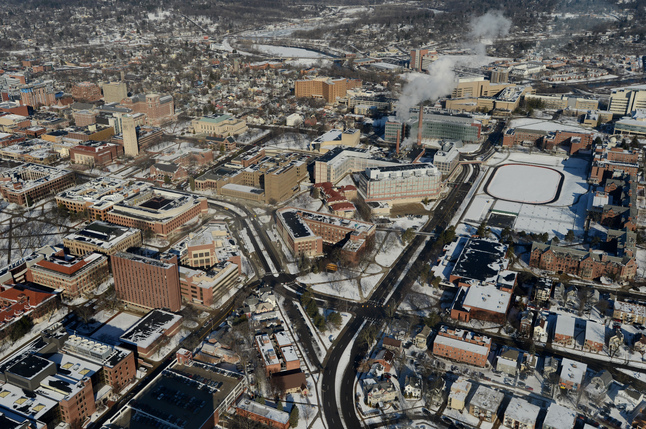
The University of Michigan's downtown Ann Arbor campus.
University of Michigan recently received a $110 million donation from a California billionaire, which is the largest donation in college history and was received just before the official launch of the school's next capital campaign.
The exact goals of the school's campaign haven't yet been made public, but officials say they'll be seeking donations centered more toward scholarships and less toward buildings, which is a shift from the school's last Michigan Difference campaign. That effort raised $3.2 billion for the college, well above its $2.5 billion goal.
Within the last year U-M has closed on four of the largest donations in the school's 196-year history. The top 10 single donations at U-M add up to a staggering $580 million.
All gifts to the university since July 2011 will count toward the school's fundraising goal when it launches its formal campaign in the fall.
Here's a look at the school's 10 largest gifts:
$110 million in April 2013
Charles Munger's $110 million gift, announced in April 2013, will go toward building an interdisciplinary graduate student dormitory and fellowship program. The gift is the largest single donation in U-M history.
The gift will fund the majority of a 600-bed, 370,000-square-foot $185 million apartment-style dormitory that will be limited to graduate students; $10 million of the award will go toward creating fellowships for the graduate students.
Munger was an undergraduate mathematics student at Michigan in the 1940s, but did not graduate. He did eventually graduate from Harvard Law School. The California billionaire is the vice-chairman of Berkshire Hathaway and a close confidant of Warren Buffet.
Previously he's given $20 million toward a graduate housing renovation for the Law School and $3 million for improvements to the school's law quad.
$100 million in September 2004
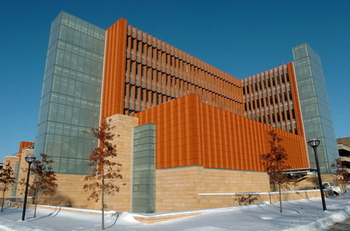
The Stephen M. Ross School of Business
File photo | AnnArbor.com
New York City real estate developer Stephen M. Ross gave $100 million to U-M's business school during the Michigan Difference capital campaign, prompting regents to rename the business school after the U-M alumnus.
Ross, a Detroit native, earned a bachelor's degree from U-M's business school in 1962. His gift was the first nine-figure donation to the university and one of three in the school's history.
His gift supported the construction of a new, modern building for U-M's growing business program. About $50 million of the donation was distributed over the course of 10 years, with the remainder of the money as a bequest of Ross' estate.
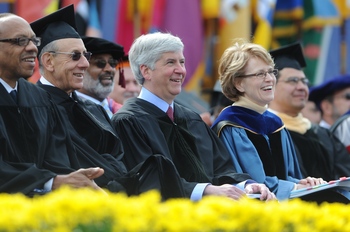
Stephen Ross, wearing sunglasses, sits next to Rick Snyder and Mary Sue Coleman during University of Michigan's 2011 commencement.
Melanie Maxwell | AnnArbor.com
"This should be a very iconic building," Ross said when his donation was announced in September 2004. "When you see a picture of it, you know this is the University of Michigan Business School."
$100 million in April 2011
A. Alfred Taubman, a shopping mall mogul who hails from Detroit, enrolled in U-M's architecture college on the G.I. Bill after returning from World War II in 1946. Taubman left U-M in 1948 without graduating, but returned half a century later to become one of the school's most philanthropic alumni.
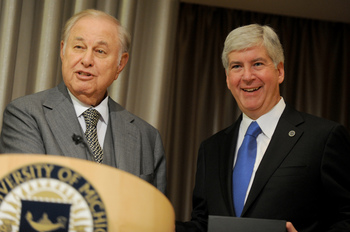
A. Alfred Taubman and Gov. Rick Snyder during a symposium at the A. Alfred Taubman Biomedical Science Research Building in 2011.
Angela J. Cesere | AnnArbor.com
Taubman, who is worth an estimated $2.9 billion, has given more than $142 million to U-M over his lifetime. Taubman is credited with creating the shopping mall concept and founding Taubman Centers, Inc., a high-end retail business.
Taubman's $100 million donation was given in phases, the last of which was a $56 million sum in 2011. That sum is being used to explore the potential of embryonic stem cell research. An earlier $22 million gift created the A. Alfred Taubman Medical Research Institute, where scientists are exploring cures and treatments for Lou Gehrig’s disease, breast cancer, prostate cancer, childhood cancers and other diseases.
In addition to the institute, U-M named its Biomedical Science Research Building in Taubman's honor.
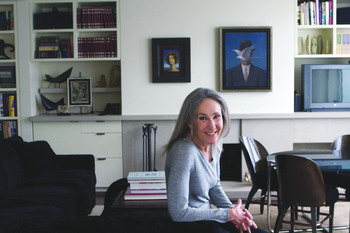
Helen Zell
Photo courtesy Zell Family Foundation
$50 million in March 2013
This winter Chicago philanthropist Helen Zell, wife of billionaire real estate tycoon Sam Zell, donated $50 million to the College of Literature, Science, and the Arts toward a creative writing program.
The gift permanently funds the school's Master of Fine Arts in Creative Writing Program, which is being renamed the Helen Zell Writers' Program. Zell offered an initial $10 million donation to the program in 2004. She's given a total of $60 million to the university.
The program provides 22 students with more than $1 million of financial support each year through tuition waivers, stipends and health insurance. It provides year-long fellowships, dubbed Zellowships, to qualifying graduates of the program. Zell received her English degree from U-M in 1964.
Her donation is believed to be the largest gift given to a college writing program.
$50 million in March 2013
U-M's health system renamed its cardiovascular center after Samuel and Jean Frankel, a couple who gifted $50 million to the center during the past six years.
The center received its first $25 million gift from the Frankel family's foundation in 2007, although at the time it was given anonymously. Another $25 million gift from the family was awarded to the center in March and will go toward financing clinical research and patient support.
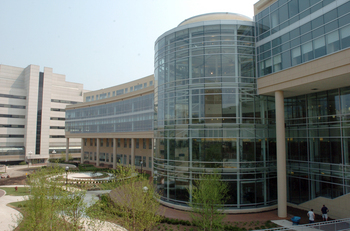
The Samuel and Jean Frankel Cardiovascular Center
File photo | AnnArbor.com
"The Frankel family has decided to gift another $25 million and this will help us build on the successes of the last six years, to create a culture of total partnership," said health system CEO Ora Pescovitz. The second $25 million gift was contingent on the cardiovascular center reaching certain benchmarks with the first allotment.
$44 million in November 2004
Delores and William Brehm gave $44 million to the health system to work toward a cure for type 1 diabetes. Two floors in the 222,000-square-foot addition to the Kellogg Eye Center are dedicated to the Brehm Center for Type 1 Diabetes Research and Analysis. The tower, built in 2006 at a cost of $121 million, is also named after the Brehm family.
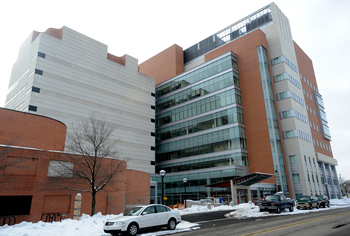
The Kellogg Eye Center's Brehm Tower
Melanie Maxwell | AnnArbor.com
Their donation was part of the four-year Michigan Difference campaign, which raised $3.2 billion for the school.
William Brehm, a businessman in the defense industry, received a bachelor's degree from U-M in 1950 and a master's in 1952. He is originally from Dearborn, although he lived in Virginia when he made his donation. Delores Brehm graduated from Eastern Michigan University in 1950. She was diagnosed with Type 1 diabetes by U-M physicians. William Brehm received an honorary degree from U-M this spring.
Brehm also has donated to EMU. In June 2011, he and his wife gave $3.2 million to the school's College of Education to develop a special education research center.
$33.2 million in March 2000
This donation, which surpassed all university records at the time, sort of fell in U-M's lap. Lincoln Knorr owned Scott Equipment Co. of Detroit, a private firm that made machines used by commercial binderies. After his death, officials discovered that Knorr left $33.2 million of his fortune to the Ann Arbor university, where he attended law and business school.
Susan Feagin, Michigan's vice president of development at the time, said the donation "came out of the blue."
The donation is kept in a private trust and each year the university is paid 5 percent of the trust's market value. When those payments plus the bulk of the trust totals $1 billion, the entire amount will be transferred to the university. Such a transfer probably won't happen until 2030 or 2040.
$32.5 million in September 2012
U-M's art school was renamed the Penny W. Stamps School of Art and Design in September in honor of Penny and E. Roe Stamps, who donated $32.5 million to the school.
Penny Stamps, a 1966 U-M art and design school grad, and her husband live in Miami. Penny Stamps is a retired interior designer and her husband is a venture capitalist. Their gift was among the largest donations to any art school in the nation. It was matched by a $7.5 million sum from the university, giving the school $40 million in new funds.
Former U-M art school dean Bryan Rogers, who retired in May after 12 years as dean, said at the time that the gift was a "very unlikely thing to do in today's world."
"Money for the arts, in particularly the visual arts, is very hard to come by," he said.
The Stamps had previously funded a lecture series, a scholarship program and an off-campus art gallery.
$30 million in April 1992
A $30 million donation from William Davidson, former owner of the Detroit Pistons and Guardian Industries and a U-M alumnus, was used to create a business institute at U-M's business school. The institute focuses on firms in transitioning economies.
Research projects have spanned Africa, South America, Asia and Europe and coursework includes intensive MBA classes that analyze developing countries that are moving toward a market-based system.
At the time, this gift was the largest U-M had ever received and one of the largest private donations in public university history.
In 2012, the athletic department named its new $23.2 million Player Development Center after Davidson because of a $7.5 million gift. Davidson, now deceased, ran track at U-M when he was a business student in 1947.
$30 million in May 1999
More than 50 years after Taubman matriculated into U-M, he gave $30 million to his alma mater, matching the record for the largest donation to the school at the time.
In honor of the donation, regents voted unanimously to name the architecture school after Taubman- it's now called the A. Alfred Taubman College of Architecture & Urban Planning. It was the second time regents had done this. In 1935, the Horace H. Rackham School of Graduate Studies was named in honor of Rackham's $6.5-million gift.
"It was his experiences here at U-M and its meaning to him that was the source of the gift, " Lee Bollinger, who was president of U-M at the time, said during 1999 the Board of Regents meeting. "Through a visual understanding of the world, he was able to find himself."
The money was gifted to U-M's endowment in six installments over five years beginning in September. Since the donation, the school has grown by more than 100 students and developed an urban design program.
His gifts totaled $7 million prior his 1999 award, and later he would donate $100 million toward medical research.
Kellie Woodhouse covers higher education for AnnArbor.com. Reach her at kelliewoodhouse@annarbor.com or 734-623-4602 and follow her on twitter.


Comments
Frank Wilhelme
Tue, May 28, 2013 : 3:03 a.m.
In addition to his initial $30 million commitment, Bill Davidson contributed an additional $19 million in 1998 to expand the operations of the William Davidson Institute. Furthermore, he contributed $5 million to assist with the construction of Sam Wyly Hall which in part serves as the headquarters of the Institute.
genetracy
Mon, May 27, 2013 : 3:37 a.m.
Just think of the all of the food that money could buy to feed the homeless.
Jay Thomas
Mon, May 27, 2013 : 1:42 a.m.
Anyway, despite the U always pleading poverty, it has plenty of money. You guys should see what many of the less than name brand universities get by with.
sheri barron RN,BSN
Sun, May 26, 2013 : 5:46 p.m.
I hope the University will use some of the money for mediation. It would be nice to think that the University tries to do the right thing. I went to risk management and many other places to get answers from UMICH before I got a lawyer. www.google.com sheri barron on vimeo.
Greg
Sun, May 26, 2013 : 4:27 p.m.
As far as comments like " As to you who complain about tuition, UM would be cheap at quadruple the price as evidenced by out of state demand." go, this college is supposed to be primarily for the people of the state of MI, not other states and countries. That is why it was created and funded by the state - taxpayers of Michigan.
sheri barron RN,BSN
Sat, May 25, 2013 : 11:40 p.m.
my point is that the the U gets millions to help them help others, but when the U skrews up they seem to avoid owning up to it. It seems like they would rather give their high powered lawyers the money they could be given the patients and employees they hurt. It seems like they force the patients or employees to spend every dime they have to try and get justice, yet they accept all of these donations with open hands.
rm1
Sat, May 25, 2013 : 10:20 p.m.
It's probably useful to note, in the interest of financial precision, that the State's contributions to U-M's budgets in 2012-2013 was $273.1 Million. http://annarbor.com/news/tuition-ready/ That's under 5% of the total budgets of nearly $6 Billion. The other 95% comes from other sources. (The "general budget" mentioned in the article is one of four budgets in the U's accounting system, totalling near $6B. The research budget, overseen by VP-Research Steven Forrest, is itself another $1.3 Billion or so, mostly money new to Michigan, and mostly expended here.) This information is not exactly new to these comment pages, although the complainers act like these aren't facts. (Facts not required by these people?) Again, without the University of Michigan, Ann Arbor would be an economic backwater. And without all the salaries paid, materials and services purchased, etc., Ann Arbor's property tax receipts would be very much smaller.
sheri barron RN,BSN
Sat, May 25, 2013 : 7:23 p.m.
Wow, if they only knew how UMICH treats their patients and employees at times. Unbelievable. This is how the U can afford all of the apparant cover-ups, pay raises and promotions for doing terrible things.
HBA
Sat, May 25, 2013 : 6:59 p.m.
For all those who constantly carp about the U-M not paying taxes, please take a step back and think where this City would be without the University of Michigan.
Jay Thomas
Mon, May 27, 2013 : 1:40 a.m.
A lot of these kind of comments are from UofM employees WHO DO NOT LIVE IN ANN ARBOR.
jen777
Sun, May 26, 2013 : 3:45 a.m.
Exactly what i was going to say - this town exists today due to the university - stop carping
MRunner73
Sat, May 25, 2013 : 6:46 p.m.
An informative article. Glad to know there are many mega donors out there. The folks mentioned above walk the walk. Too bad that no U of M alum won the recent $600 million jackpot.
Jay Thomas
Mon, May 27, 2013 : 1:39 a.m.
Because there is no more worthy cause than UofM... is that it?
BhavanaJagat
Sat, May 25, 2013 : 5:30 p.m.
Whole Dude - Whole Trickle: The University of Michigan and its educators must contemplate upon the use of education to reduce social and economic inequalities. If men are born equal, the primary concern of education must be that of removing the problems that create inequalities. Thomas Jefferson had very wisely substituted the "pursuit of happiness" for "possessions"(property) in the trinity of inalienable natural rights stated by John Locke. It is only under tyranny, we establish a class of wealthy people. The idea of pursuit of happiness is attainable only by diligent cultivation of civic virtue. The first virtue is that of avoidance of accumulating personal wealth and personal possessions. Freedom is not about donations that trickle down from the top to the bottom levels of human society.
sheri barron RN,BSN
Mon, May 27, 2013 : 3:34 p.m.
I agree. It would be nice if the University would use the money to help 'the nurse aide'- who by the way- has the MOST contact with the patients and their families. It seems they can call their muscle men/women to humilate them in front of everyone by hauling them off because (for example) they stamped their own parking ticket, but the real criminals (in my mind) are the ones whom get promotions and raises for actually causing or potentionaly causing serious harm. Not reporting pediatric doctors that carry their child porn videos with them to work, getting promoted for calling someone's personal car insurance carrier -to try and defame that employee, promoted after many deaths on a unit (I feel should have been prevented). Nurses that are not fired after they admit to lying about a death in their family to get a weekend off. They are then employed by the State Prison system. Is this to keep the lid on all of their wrong doings? Why not just tell the truth and use the money they spend on high powered attorneys to help the families that they hurt?
Long Time Resident
Sat, May 25, 2013 : 5:12 p.m.
I wonder about the Cook gifts that gave us the Law Quad and Marta Cook Hall? Or the Clements gift (rare book library) or Rackham for graduate school? How about a supplement to the article with some inflation adjustment? As to you who complain about tuition, UM would be cheap at quadruple the price as evidenced by out of state demand. Paying $45k for 4 years is a steal. Student loans to cover that are about equal to a car payment.
ManA2
Sat, May 25, 2013 : 2 p.m.
Along with the other 14 public universities in Michigan, U of M used to be overwhelmingly funded by the state. Now it primarily comes from tuition and donations. Without these donations tuition would be dramatically higher. What is needed is a recommitment by the state to an affordable public education for its citizens. The University has done a better job than almost all public universities in the country in cultivating these donors to maintain the quality of education here. Well done.
Basic Bob
Sat, May 25, 2013 : 4:49 p.m.
"A recommitment by the state" is not forthcoming. That would mean more money from taxpayers, most of whom do not directly benefit from lower tuition. And most of whom do not see how they indirectly benefit. Michigan is not unique. Most states funded public universities at a high level 30 years ago, and then they started diverting funding to other social programs. At that time, the baby boomers were the primary beneficiaries; today they are filling the Social Security and Medicare pipeline, and are reluctant to support tax increases which benefit the young and the future. Even then, not everyone who qualified for those historically great tuition deals were taking them. Many thought they could do just as well as their fathers working long hours in the factories filling orders for the expanding middle class. Today many people are taking on life-changing amounts of debt, are unable to complete their education, and have little to show for it. The majority of taxpayers couldn't care less.
Gardener1
Sat, May 25, 2013 : 1:46 p.m.
Without the donations, U or M would be more expensive or without new construction. The donations towards buildings help keep construction companies busy and workers paid as well as any other companies and workers who supply the materials. The buildings provide space for new employees of all levels from doctors, professors, administrative assistants, food service, custodians, tech support, etc. That is how money then comes back to the community so people can pay their own property taxes, buy food and consumer products.
blue85
Sat, May 25, 2013 : 4:38 p.m.
All true, especially since 2/3 of all donations come from the 1/3 of the alumni population which lives out of state. This is all "new money" to Michigan. But people will always find a way to argue with success, look the gift horse in the mouth, or snatch defeat from the jaws of victory...the negative thinking on this board gives you a clue as to where those cliches come from.
Craig Lounsbury
Sat, May 25, 2013 : 1:24 p.m.
The board of regents runs OUR University on our behalf. They are elected and can be contacted via assorted means to make concerns felt. Here is a link to their bio page. Click on a face and you get contact info. http://www.regents.umich.edu/about/bios/
Jay Thomas
Mon, May 27, 2013 : 1:37 a.m.
Sorry, they went "native" and identify more with the faculty they are overseeing than taxpayers and students. Which is why they rubber stamp everything put before them. I really don't even know why they are there.
blue85
Sat, May 25, 2013 : 4:36 p.m.
"The board of regents runs OUR University on our behalf. " It is always so cute when you talk about "your" university: 1) the state pays close to zero per year for the capital plant...the current capital plant has everything to do with the donors and with the university fiscal management of the endowment; 2) the state pays a derisory sum to bridge the net cost to students and full tuition, and ranks among the worst in the nation in support for eduation. Claiming it is your university is like being a cheat on child support: you want to show up for your kids sporting events, but don't want to send a check to your ex. UM has thrived despite the neglect of the state and its citizens who don't seem to value education. But keep patting yourself on the back...self delusion is sometimes a pivotal part of one's (aka yours) world construct.
Greg
Sat, May 25, 2013 : 1:24 p.m.
No doubt this will enable them to not have a raise in the price for students this year. NOT LIKELY.
notnecessary
Sat, May 25, 2013 : 1:23 p.m.
To all the commenters complaining how this doesn't lower tuition costs or pay taxes ... The gifts are directed to the areas of the university that the donators want them to be. For example some are used for fellowships or grants for students, others for specific research, others for specific capital improvements... Why cant people ever be happy with the single institution that makes Ann Arbor what it is, without U-M there's no tax base to have and although tuition is high that's hardly a problem constrained to this school.
blue85
Sat, May 25, 2013 : 4:32 p.m.
Yes, all true. Most of the negative commentators don't realize that UM is, in essence, a "price taker"...that is most of its pricing structure on the cost side is set in various markets, none of which UM controls...UM "takes" the market price. Yes, they may "choose" to pay high salaries, but those salaries are prices set in the market; UM can choose to not pay market and will thereby lose talent and become less than what it is. If people want a UM diploma to hold value, they have to pay market rates. Likewise for the $1,000,000,000 supply budget for everything from lasers to paper cups. This is not a UM-driven problem, tuition increases are a national problem. Paying to educate people reaps long term rewards. If you want a second rate society, you should move to a country which only needs to pay for one book...a bible, a torah, or a koran. In one-book countries, education is very cheap.
81wolverine
Sat, May 25, 2013 : 12:53 p.m.
These donations are all great and can really help in some key areas. But to put this in perspective, all of these donations and increase in the University endowment fund have done nothing to make tuition lower or even more affordable. Tuition and other costs have continued to increase way faster than inflation. Will they ever have enough money?
blue85
Sat, May 25, 2013 : 4:27 p.m.
"But to put this in perspective, all of these donations and increase in the University endowment fund have done nothing to make tuition lower or even more affordable." The above is utterly false. The university's web page states that despite roughly 50% cuts in state aid over roughly 10 years, the cost of attendance for a family making under $80,000/year is the same as it was something like 7 or 8 years ago. Let's take the contrary case, are you prepared to argue that donations which increase resources also increase costs? That would truly be alchemy: a donation which destroys value. If you can prove such a case, you've got a journal article or book which will win you fame and fortune.
In doubt
Sat, May 25, 2013 : 12:44 p.m.
Remember this in August when we read about tution hikes. My heart just bleeds for the students and their parents that are trying to fulfill their dreams of a UofM education.
blue85
Sat, May 25, 2013 : 4:24 p.m.
"Remember this in August when we read about tution hikes. My heart just bleeds for the students and their parents that are trying to fulfill their dreams of a UofM education." Yes, remember it, because of gifts like this, tuition is lowered. How? Because, by substitution, every gift of the type mentioned creates budget relief for the university in some other category. Relieving a building budget constraint, for example, means that more money can be spent on every other line item, including tuition. Therefore, each such gift, directly (Richard Rogel's gift of $22MM or so for scholarships) or indirectly (Munger gift for housing means housing rates are partially contained) reduces UM tuition.
ownrdgd
Sat, May 25, 2013 : 11:03 a.m.
And with all there funds they still pay ZERO property taxes and STILL receive state aid. A real friggin farce
MRunner73
Sat, May 25, 2013 : 6:41 p.m.
Thank you, johnnya2 for pointing out the truth behind many other organizations that do not pay property taxes. Yes, the University does act like a Fortune 500 company but is not doing anything illegal or trying to get away with something.
johnnya2
Sat, May 25, 2013 : 3:29 p.m.
What does one have to do with the other? UM is STILL a public University. Does the Capitol in Lansing pay property taxes? NOPE. Does Ann Arbor city hall? NOPE. Does any fire station? NOPE. The UM IS a part of the government. I also wonder why I never hear this same thing regarding every CHURCH in the Ann Arbor area. They receive donations EVERY week, use the money to buy property and pay ZERO property tax
jns131
Sat, May 25, 2013 : 2:57 p.m.
I could not agree more. AND they are still taking land away from Ann Arbor tax base. Think they will share any of it with AAPS? Nope. Once AAPS is gone there will be nothing left for UM to take.